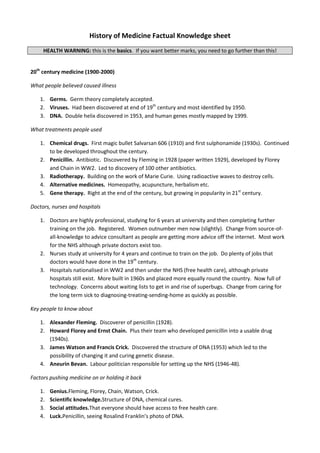
Facts 20th century
- 1. History of Medicine Factual Knowledge sheet HEALTH WARNING: this is the basics. If you want better marks, you need to go further than this! 20th century medicine (1900-2000) What people believed caused illness 1. Germs. Germ theory completely accepted. 2. Viruses. Had been discovered at end of 19th century and most identified by 1950. 3. DNA. Double helix discovered in 1953, and human genes mostly mapped by 1999. What treatments people used 1. Chemical drugs. First magic bullet Salvarsan 606 (1910) and first sulphonamide (1930s). Continued to be developed throughout the century. 2. Penicillin. Antibiotic. Discovered by Fleming in 1928 (paper written 1929), developed by Florey and Chain in WW2. Led to discovery of 100 other antibiotics. 3. Radiotherapy. Building on the work of Marie Curie. Using radioactive waves to destroy cells. 4. Alternative medicines. Homeopathy, acupuncture, herbalism etc. 5. Gene therapy. Right at the end of the century, but growing in popularity in 21st century. Doctors, nurses and hospitals 1. Doctors are highly professional, studying for 6 years at university and then completing further training on the job. Registered. Women outnumber men now (slightly). Change from source-of- all-knowledge to advice consultant as people are getting more advice off the internet. Most work for the NHS although private doctors exist too. 2. Nurses study at university for 4 years and continue to train on the job. Do plenty of jobs that doctors would have done in the 19th century. 3. Hospitals nationalised in WW2 and then under the NHS (free health care), although private hospitals still exist. More built in 1960s and placed more equally round the country. Now full of technology. Concerns about waiting lists to get in and rise of superbugs. Change from caring for the long term sick to diagnosing-treating-sending-home as quickly as possible. Key people to know about 1. Alexander Fleming. Discoverer of penicillin (1928). 2. Howard Florey and Ernst Chain. Plus their team who developed penicillin into a usable drug (1940s). 3. James Watson and Francis Crick. Discovered the structure of DNA (1953) which led to the possibility of changing it and curing genetic disease. 4. Aneurin Bevan. Labour politician responsible for setting up the NHS (1946-48). Factors pushing medicine on or holding it back 1. Genius.Fleming, Florey, Chain, Watson, Crick. 2. Scientific knowledge.Structure of DNA, chemical cures. 3. Social attitudes.That everyone should have access to free health care. 4. Luck.Penicillin, seeing Rosalind Franklin’s photo of DNA.
- 2. 5. Communication. Loads, especially computers. 6. Competition.Pharmaceutical companies manufacturing drugs. 7. Teamwork.Penicillin team, Watson and Crick, Human Genome Project. 8. Government.US penicillin grant in WW2, vaccination programmes, funding for NHS… 9. War. Hurried the development of penicillin. Exam board specifications highlight: High tech medicine, influence of science/technology on medicine, Watson and Crick, pharmaceutical industry, greater use of vaccinations, development of antibiotics, understanding genetic conditions, improved access to treatments (free health care), better training of doctors/ nurses, Fleming, NHS, alternative and informal medicines.